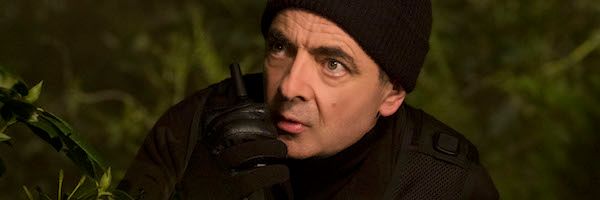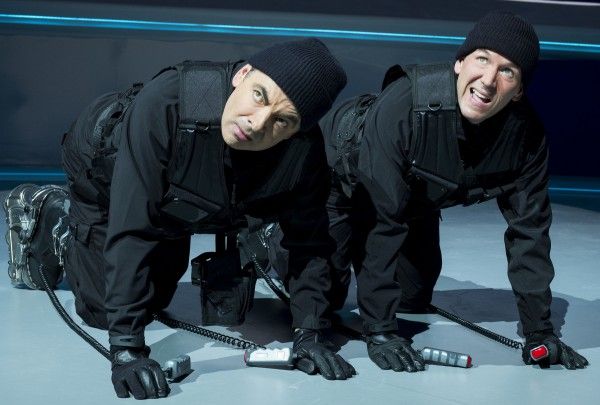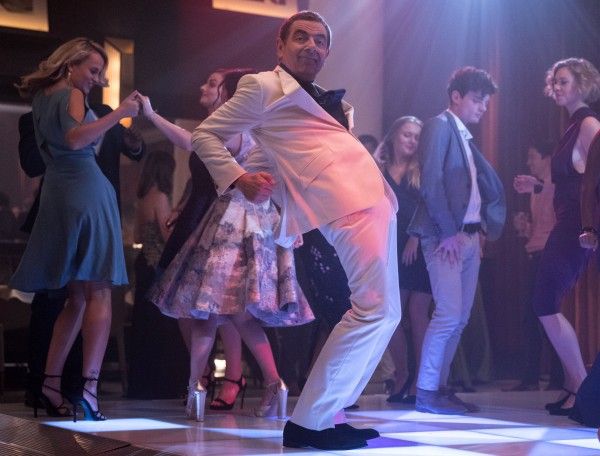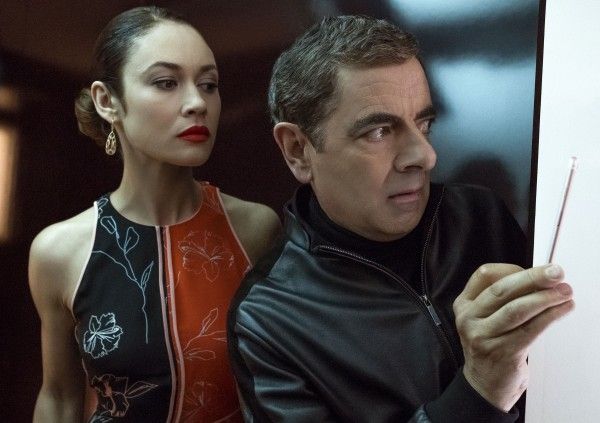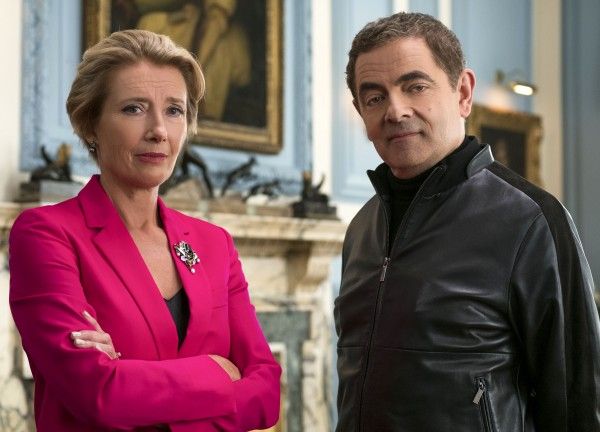In Johnny English Strikes Again, the UK is in peril, as a result for a security breach at MI7, leaving every agent in the field identified and exposed, and the only option left is to turn to Johnny English (Rowan Atkinson) to save the world. Casting aside his job as a teacher, he accepts the mission, but quickly realizes that being an analog spy in a digital world may prove to be a bit of a challenge.
During this 1-on-1 phone interview with Collider, director David Kerr talked about why he felt he was suited to direct Johnny English Strikes Again, the trickiness of making a successful action-comedy, the sequences that he had the most fun shooting, collaborating with someone as talented as Rowan Atkinson, having Emma Thompson play the Prime Minister, and what he’s looking to do next.
Collider: If Johnny English were a real person and it came down to needing him to save the world from total destruction, would you be okay with that or would you feel a bit concerned about the ultimate outcome of that?
DAVID KERR: Well, even though he thinks that he’s James Bond, he’s something short of that, and in that gap lies so much of the comedy. The truth is that Johnny English has proven that he gets results. He actually manages, and has done so across three movies, to pull the proverbial cat out of the bag and overcome the threat, on so many occasions. If you’re gonna look at it, in terms of results, you know his track record is great. So, on that count, I’d certainly favor him. I know I’d have more fun watching him doing it than I might a more conventional Daniel Craig-esque Bond.
How did the opportunity to direct this come your way, and what made you feel like you were well-suited for this movie?
KERR: I suppose that I’ve been a fan of Rowan’s all my life, really, from watching him in sketch in Not the Nine O’Clock News and the wonderful historic sitcom The Black Adder to Mr. Bean and Johnny English, so I had an admiration of what he did. When Working Title, Universal and Focus, started developing this third movie, Rowan was aware of my work in TV. I’ve spent a lot of time directing comedy television, in the UK particularly, so I’ve got a lot of flying hours, working out how to make scenes funny and figuring out what the best way is, of shooting something to land the comedy, and across a whole series of sub-genres within comedy, whether it’s dark comedy, twisted comedy or horror comedy. I haven’t done much family comedy, oddly enough, and that’s probably where this sits, in that it’s going for jokes that can play to adults and a younger audience. That’s a tough target to hit. You seek not to alienate either end, but that’s the challenge of it, really. In many ways, it’s easier to make a film that’s very particularly pointed at literate, high-brow, dry wit level of comedy, and I’ve done my fair share of that. This is going for a bigger target. It’s a harder one to land.
When all of these wild and crazy things are happening in a movie, as the audience, we can just sit there and enjoy the movie and be delighted by them, but as the filmmaker, you actually have to pull them all off, and it seems like any one of the sequences in this film could have been a challenge. Was there anything, in particular, that you had the most fun shooting and watching Rowan Atkinson do, and were there things that you just couldn’t believe you actually had to pull off?
KERR: A movie like this should feel simple and effortless and spontaneous, but the making of it is none of those things. It’s all incredibly planned and very closely choreographed, and there’s an enormous amount of storyboarding and forethought that goes into it. But there are few things to match the delight of watching Rowan on the dance floor, finding physicalized moves for the scene where he’s losing control on the dance floor. The initial part of that scene is very much Rowan free-styling. That’s him playing around with what he thinks will be physically funny. And in the second half, when Ophelia turns up and – plot spoiler – tries to kill him, that was a more choreographed series of events, where I worked closely with Rowan and Olga [Kurylenko] to work out the cat-and-mouse push-and-pull. I also worked with a choreographer, Litza Bixler, who I’d worked with before, to really refine that, so it had a development and could be sustained as a piece of visual cinema.
But I suppose the scene that’s probably the most pleasing, from a director point of view, is probably the virtual reality scene. There are a lot of scenes in this movie, which a Keaton or a Chaplin could recognize, in many ways. They’re quite classic tropes of physical comedy. But I’ve never seen the virtual reality thing done before, so that was the challenge of it. We had to pull off a quite complicated sequence where something he thinks is happening is quite different from what’s actually happening. That took a lot of planning and a lot of finessing in the script stage. And then, there were ongoing negotiations between locations we found. We had to build the virtual point of view, so that there was a resonance between what was happening in one world and the other, and the building of the comedy, and hopefully not too much repetition of the jokes.
It was a real jigsaw puzzle to get it right, and to get the pieces to fit seamlessly. When we first started putting it together in the edit suite, a couple of producers watched it, and at that point, we didn’t have the animated virtual reality point of view material – we just had my black and white storyboards – and the wind was going out of the comedy sails, every time we’d come to that. The producers were like, “Well, this isn’t funny. I thought this was going to be funny, and it’s certainly not funny. I think you’d better cut the scene down, keep it really tight and let’s just get through it.” And I was like, “No, no, no. When we get the virtual reality POV stuff built up and designed properly, then it’ll really start working.” Respect to them, they kept the faith. When that material came in, it really worked. It was a joy to watch it, as I did, with an American audience, and hear people hooting with laughter, as the laughter builds across the scene. That’s just the ultimate validation.
Was there anything that you had to cut from this film that you were sad to lose, but it just didn’t fit, so it had to go?
KERR: There aren’t really deleted scenes. We were quite hard on ourselves, at the script stage, to try and trim the fat. I suppose there are quite a few scenes where we’ve done the usual of losing a line here or there because something plays better with a look. I don’t think there’s a story strand that we cut, and there are very few entire scenes that we lost. So much of it is just about finding a rhythm for the comedy and making sure the thing has pace. There is an edict in comedy that faster is finer, and that’s not always the case. You can watch a screwball comedy like His Girl Friday, and so much of that depends on the pace of the actors dealing with the dialogue. Equally, there’s a real joy in watching something play out in a longer take, and you can see that in a Keaton movie or a Wes Anderson film, where sometimes just watching the action unfold in a plain, wide shot can be immensely gratifying. You feel that you, as a viewer, have found the joke within the frame. It’s really about trying to understand what the right device is, at that point in the narrative. It’s also about trying to sense when you might be losing an audience’s engagement because this kind of film is ultimately a comedy and that’s how it has to work. What you want to avoid, which unfortunately does happen in comedy, is that sense that there are two or three good laughs, and in between them, there is 20 minutes of tumbleweed. That’s really what you want to avoid. You want to feel that you’re constantly changing location, moving somewhere new, and sharing something different to laugh at, and then hopefully, the chuckles keep coming.
Rowan Atkinson has great comic instincts and knows this character better than anyone. What was the collaboration like with him, throughout the shoot?
KERR: Well, it was immensely close because I’m Rowan’s first audience. Although Rowan brings an incredible amount to the table, and he would do some very funny things unprompted, he absolutely needs input. He wanted me to say why I thought something was funny, and why I thought something might potentially be funnier. Very often, as you get a take that you think is really working, you want to try one more to maybe play it a bit faster, or try raising an eyebrow at the end of a line, just to feel a bit more smug because it’s always funnier, if Johnny is smug before the fall. A lot of the time, I would just be there on hand to remind him of a little detail that he could deploy, or to just recalibrate it slightly. Often, I would just reassure him because it’s a very lonely life, being a star in a movie. Everybody assumes that you work on autopilot and just do it, and that it just happens. The truth is that all actors have days when they feel that they’re not quite bringing it, so a lot of the time, it is absolutely supporting them in what is a very exposing position. He is so fundamentally talented, and also a perfectionist, and that’s what you want, really. You want to work with people who are setting high standards for themselves, and not just phoning it in.
What was it like to have Emma Thompson on board as the Prime Minister? What did she bring to the set, and what do you feel her character added to this?
KERR: I’m not really allowed to have favorite actresses, but Emma is probably my favorite actress in the world. I think she’s extraordinary. She started out as a comic actress, but she’s proved her mettle as a dramatic actress. She’s the whole package. I don’t think anyone else has won an Oscar for writing and acting. She’s just a towering talent. She’s also a wonderful human being, and has a great comic brain. What she does as Prime Minister, we had to have a character that felt rooted and like there were genuine challenges for her. She had to feel like someone who could exist in the real world, trying to push back and raise her standing in the opinion polls. These are characters we’ve seen in the real world, whether it’s Theresa May trying to battle Brexit, or Donald Trump trying to battle pretty much anything. There’s this reality of someone who’s really quite capable, but forced on the back foot by events, and that felt like a great thing to get behind. She couldn’t be too cartoon-y. She couldn't be too much of a joke. But equally, you have to believe that she could be susceptible to the Jason Volta character, partly because he’s so suave, but also he just seemed to have the answers to her problems. People in political roles are now expected to deliver the goods and have the answers today, or the public patience and the media tolerance of any delay is minimal. That all felt like grist to the mill.
You’ve directed a lot of television in the UK. Have you thought about where you want to go next, after this film? Are you looking into directing any television in the States, or are you looking to do more feature film work, either in the UK or the US?
KERR: I think it’s an interesting time, at the moment, where the line between TV and films is ever more blurred. The prestige of directors working in television was much less common than it is now. Very few directors say, “I don’t do TV.” Certainly, I can’t say that because I’ve had a great career in television, and I love it. But in terms of where next, I’m just drawn to good material and good characters, and the challenge of making something the best version of what it could be. I’m reading all kinds of scripts, at the moment, that are features and a few TV things. I’m not in a hurry to sign up because, when you take on a movie, it’s at least two years of your life. And I like to throw myself into it, so I have to feel like I’ve got something that I can add to it, and that it’s not just a job for work.
It seems like any movie you’d do after this, if it has any action in it, it will feel like a breeze compared to this one.
KERR: The action is just enormous fun, especially if you’ve got a little bit of a budget. This wasn’t a big-budget movie by studio standards, but it’s certainly a lot better resourced than anything I’ve done on TV. The challenge with comedy, which really is my first love, and the challenge with an action/comedy, particularly, is that you really want the action scenes to feel like they’re also true to character and still in tune with comedy. They can’t just feel like chase-y, punchy, action-y stuff that’s threaded between a bunch of scenes of people saying funny things. You really want those action scenes to also feel like they’re part of the very fabric of the film and the comedy.
Johnny English Strikes Again is now playing in theaters.

